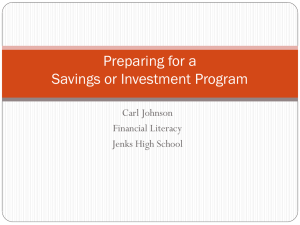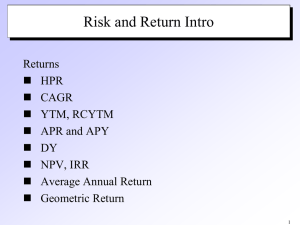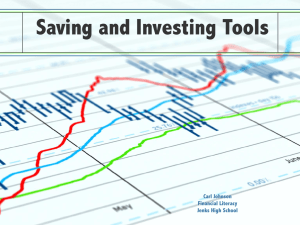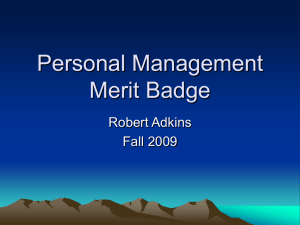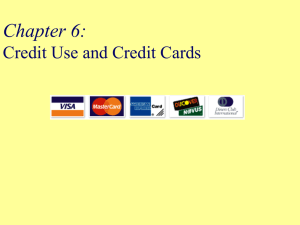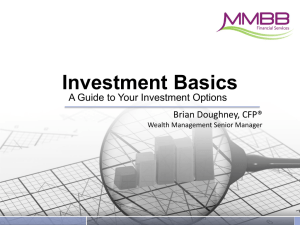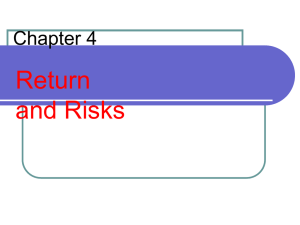Presentation
advertisement
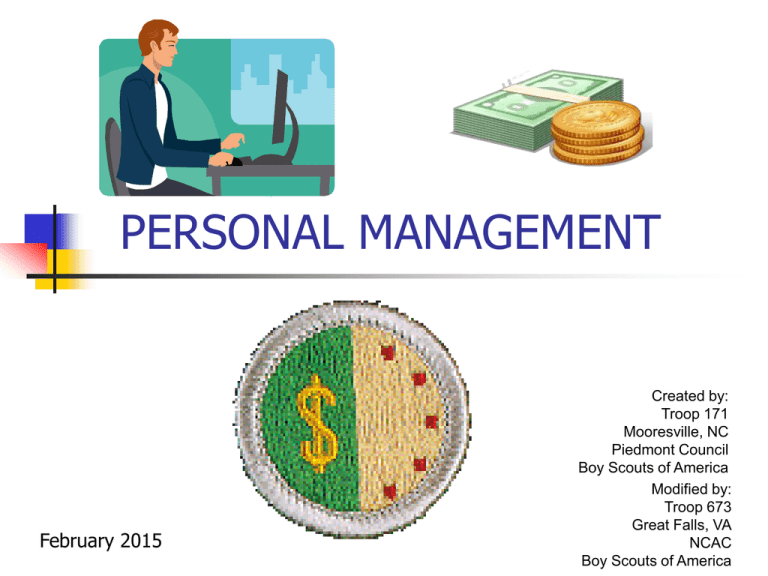
PERSONAL MANAGEMENT February 2015 Created by: Troop 171 Mooresville, NC Piedmont Council Boy Scouts of America Modified by: Troop 673 Great Falls, VA NCAC Boy Scouts of America WHAT IS PERSONAL MANAGEMENT ALL ABOUT? WHO MANAGES YOU TODAY? WHAT IS PERSONAL MANAGEMENT ALL ABOUT? WHO MANAGES YOU TODAY? Your Parents or Guardian Teachers/Professors Coaches Personal Management…….. Is taking control of your life. Making good decisions. Responsible for successes. Responsible for mistakes. MANAGING YOURSELF & MANAGING YOUR MONEY Managing Your Money No matter how much money you earn, you will need to manage it on a consistent basis. People today do not stay at one job for their life. Short Term and Long Term Goals need to be set. Earning…….Spending……..Savings!! When buying an item, you need to reduce expenses in other areas……..examples?? ____________! Money is a major part of life, it affects your family’s well being, however it should not be everything. Why? Smart Shoppers! Requirement 1 Do: Research the item they want to buy Watch for sales. Comparison Shop. Use Advertisements. Consider Alternatives. Use Consumer Buying Guides. Use the internet to check prices. Research The Item You Want Products Features Quality What can you live with or without. More features, more money! Paying more, will it last longer. Look for comparable quality for less money. Opinions From Others Talk with people who own one already. How do they like it? What did they pay? Requirement 1 Buy It On Sale! Look for stores who have sales/specials on items Clearance Items Seasonal Sales Promotional Sales New Items Blemished Goods………..special in store discounts. Buy second hand? Requirement 1 Usually large discounts. Flea Markets Garage Sales/ Yard Sales Swap Meets Comparison Shopping Requirement 1 Compare at least three stores for price/availability. Check the Internet, Catalogs, & Local Stores. Check Cost per Unit, if you are buying goods in quantity. Food for example. Check store guarantees, store or internet return policies. Shipping needs to be added on internet orders. Always check the stores for “price matching” discounts. Ex Lowes, Home Depot, Walmart. Advertisements Informs you of pricing, features of a product and where to buy it. Requirement 1 Be careful of advertisements, they sometimes stretch the truth. Bait & Switch? What is this??? Products say “New & Improved”. Need to check what the improvements are. Especially on new models, they usually cost more money. Alternatives/Impulse Buying Part of being a good money manager is knowing when to say “NO” to yourself! Impulse Buying-(it is an immediate need/must have) Requirement 1 Try not to be in a hurry to buy the newest items, they reduce in price after being on the market for awhile. Sometimes the newest/greatest is not so good! Ex Shopping for food when you are hungry. Some people over buy when they are sad for comfort. Feeling to “keep up with the Jones’s”. Do not let money “burn a hole in your pocket”! All kinds of feelings can affect your buying habits. Cash or Credit…………$$$$$ Do you use cash or credit to purchase? What is the difference between cash and a credit card. What is buying on credit mean? Credit cards are convenient, easier to return items when purchased on credit cards. Good record of expenses. Better than carrying a lot of cash around. Requirement 1 Always pay off your monthly balance owed. Try not to carry a balance on the card, you will pay much more than the original price. WHY?? Requirement #1….Discussion Making a major family expense. Example could be a big screen TV. Many questions need to be asked. Requirement 1 Who will benefit from the purchase? Which manufacturer makes the best TV? Need additional equipment? How much of a budget do you have? $$ How big is your room. Which manufacturer has best warranty? Where should I shop? Internet/Store Can I buy used/reconditioned? Requirement #3….Discussion Money and Emotion When I receive money, I feel ____________________. If I have $10 in my pocket, I feel _____________. If I have $100 in my pocket, I feel ______________. When I buy a new _________, I feel ___________. A few months later I feel ___________ about it. Buyer’s remorse is ___________________________. If I go to the grocery store or 7-11 when I am hungry I often buy ________________. Requirement 3 Requirement #3….Discussion Money and Emotion When I see advertisements about something I have purchased, I feel _____________. If I put money into a savings account, what happens to it? Charitable giving is _______________. It is important because __________________. When I give, I feel _________________. I could better manage my money if I _______________. Requirement 3 Preparing Budgets A Budget is a written account of what you earn, spend and save. Organizes your finances. How much you receive. Amount used for expenses. Shows savings. Standard goal is to save 10% of what you earn on a consistent basis. A budget shows you where you are spending money. It helps guide you to either cutback on certain purchases, when you exceed your targeted expenses. Requirement 2 How Can You Save Money? Ways to earn money are: Requirement 2 ________________ ________________ ________________ ________________ ________________ How Can You Save Money? Ways to earn money are: Requirement 2 Part time work Allowance for chores Sell used items no longer needed/wanted Sell labor to neighbors/rake leaves, wash cars, cut lawns (actually a type of job) Gifts SAVINGS; Where do you put them? Requirement 4 Give some examples! SAVINGS; Where do you put them? Wallet/Piggy Bank/Drawer? Bank/ Credit Union? Investments? Requirement 4 Stocks Bonds Mutual Funds Assets/Land/Properties Bank Accounts Bank accounts keep money safe. Gives easy access to your savings when needed. Federal Government insures your money in a bank. Savings accounts earn interest. What’s that? Write checks for expenses without having the cash on hand. Debit cards can be issues on your checking accounts. Requirement 4 Interest is paid at a very low rate. You can have a checking account to use. At home at can be stolen, lost, or burned in a fire. No cash is needed in your pocket. Keeps good records of expenses. Investing vs Savings Objective with investing money A Financial Investment is something you put money into with the purpose of getting more money back! An investment can also be time/labor/asset. To make MORE money! Purchase a lawnmower to cut grass for money in the neighborhood. The best investment made is in yourself. Education, learn new trades, new skills to help you earn more income. Requirement 4 Return On Investment (ROI) Most important to understand! ROI, is the profit you receive or increased value of your investment. Total Return: is the original amount of your investment plus the increased value. (sometimes, it could be less than your original…RISK)! Requirement 4 Power of Compounding Simple and Compound Interest Simple Interest is the interest($$) earned on the deposit amount. Compound Interest in addition to being paid simple interest on the principal, you also receive it on the interest earned. Requirement 4 If you have $100.00 and you are getting 6% interest annually, you would $106.00 at the end of that year. You have the same $100.00 and you leave the entire investment alone. The interest is 10% . The first year you get interest of $10.00. You would have $110.00. The second year, you would receive 10% of the $110.00, so you would now have interest added of $11.00 that next year. Power of Compounding Requirement 4 Compounding ($100 at 10%) Year 1 2 3 4 5 6 7 8 9 10 Total Earnings Spend Earnings $10 $10 $10 $10 $10 $10 $10 $10 $10 $10 $100 Re-invest Earnings $10 $11 $12.10 $13.31 $14.64 $16.11 $17.72 $19.49 $21.44 $23.58 $159.39 DIFFICULT PART “PAY CLOSE ATTENTION” Types of Investments Two Basic Forms Loaned Investments Loan money to a company or government in return for its promise to repay the principal (amount loaned) plus interest. Its like loaning the bank your money for interest, but banks guarantee your money, the above promises to pay. Examples of Loaned Investments are: (usually very safe) Requirement 6 Money market Funds Certificated of Deposit( CD’s) Government Bonds (Savings Bonds) Corporate, Municipal or Foreign Bonds Governments, Municipalities and Companies issue bonds to raise money for special projects. Roads, Factories, Expansions etc. Types of Investments Two Basic Forms Owned Investments Is an investment where you own part or all of a company, real estate or other large asset. An ASSET is an item of VALUE. If you own stock, you are a stockholder. As a stockholder you may receive “Dividends” (profits paid to the stockholder). These profits are paid quarterly. Dividends are not guaranteed. If the asset is owned, another way to make money is to sell it for a gain. Requirement 6 You can own stock in a company (ex Mc Donald’s), you share in the profits and losses of the company. You own part of that company. If it is a stock, you buy for one amount and sell it at the higher price for a gain.\ If it is real estate, you buy low and sell high for a gain…..market conditions. Capital Gains: it is the profit you make on the sale of an asset. Owned Investment Cont. Examples of Owned Investment: Stocks in Foreign Companies Mutual Funds Real Estate (land homes, apartments, office buildings, condo) Personal Business….retail store, deli, diner etc. Commodities: Gold, Silver, Wheat, Coal,Oil Collectibles: Paintings, rare Stamps, Coins, Baseball Cards etc. You want to put your money into a low risk investment that yields a high return. These types of investments are unlikely. High Return Investments……………..More Risk! Low Return Investments……………..Less Risk (extremely safe) You need to balance your RISK. Many factors are involved. Comments? Requirement 6 Types of Investments Government Savings Bonds Safe investments backed by Federal Government. Series EE Bonds are purchased for ½ value. Full value at maturity date. You can sell after 12 months, but it takes 10 yrs plus. Series I (Inflation) Bonds are purchased at face value, you are paid interest plus an inflation amount (every six months). Need to hold for five years plus. If you cash early you pay penalties. Insured Certificates of Deposit (CD) You invest into CD for a period of time. Longer the term, the higher the interest. Pay better than savings accounts, but still very low risk (low return). You can not pull money out early. Requirement 6 Types of Investments Quality Growth Stocks These are top rated companies that are considered leaders in the industry. They have consistent earnings over time. They pay small dividends, but stock price usually rises and your total return usually increases higher than inflation. (Medium Risk) Mutual Funds Many people are afraid to invest in one stock. They use Mutual’s. Mutual Funds are a combination of stocks from a dozen or more companies. A fund manager is in charge of a lot of investors money. Mutual Funds can be medium to high risk based upon the industry or companies invested in. Requirement 6 Types of Investments Collectibles Can be extremely high risk due to the changes in the market. People take the chance to invest into these hoping the values increase. It also can become a long standing hobby. Collectors must study the market close. “Fad” items can be extremely risky investments. Commodities can be considered a type of collectible, because you are investing into the future value of something on the market. Requirement 6 Ex soy beans, gold, silver, oranges, cattle, crude oil. You buy into the future price of these items….most risky!!! Stock Market The stock market in the United States is comprised of the NYSE (New York Stock Exchange), AMEX (American Stock Exchange and the National Association of Security Dealers Automated Quotation (NASDAQ). You can track stocks by looking in the Business section of the newspaper, Wall Street Journal, and the Internet. Requirement 5…….Select five stocks from newspaper discuss the following. Current price, change, 52 week high/low Requirement 5 Borrowing Money When you borrow money to buy something you are buying it on credit, which is another way of saying that you took out a loan. Straight Forward Loan: Is a Family/Friendly loan that you borrowed from someone and pay the borrowed amount back. It could be paid in installments. Regular payments over time. Most loans require you to pay back the principal and also a finance charge (interest). Lenders like banks, charge borrowers for the privilege to use their money. You pay them interest on the amount borrowed. Requirement 7 Borrowing Money The Total Finance Charge depends on several factors: The amount borrowed. The amount of any fees charged by the lender. (Application fee) The interest rate charged, which is generally a percentage of the principal. Ex if you borrow $1,000.00 at 5%, you would pay back The $1,000 plus $50.00. How long it takes to repay loan. Requirement 7 It is better not to borrow if at all possible. Paying finance charges adds to the real cost of the item. Many times it is difficult to save enough money (ex car, house) and you have to borrow. Borrowing Money Good Tips If You Plan To Borrow $$$ Shop Around; different lenders have different interest rates. Lower rate can save a lot of $$. Compare the APR (Annual Percentage Rate); The APR reflects the true percentage of a loan. It takes into account all of the extra fees and costs over a year. Total Cost Of Loan; Lender must disclose the total amount at the end of term. What Are The Fees? Sometimes they can be very high. Paying Off The Loan Early: is there a penalty or extra charges? Why would you want to do this? Requirement 7 Borrowing Money In Order To Borrow Money: You need a good credit history. Can not have current loans out in excess of your income. You need enough money to pay the monthly payment. Proof of income/employment. Good references…..financial references, good pay history. Object purchasing could be security for the loan. Requirement 7 Credit Cards……….. Are very convenient. Actually are considered loans. Credit cards represent real money. They have limits…Why? Not all establishments accept them. Why do you think a store, gas station, etc not take a credit card? Credit cards can be trouble for some….Why? Requirement 7 Credit Record……….. When you take a bank loan, credit card or some type of loan you begin to establish a record. Credit reports are established on you with regards to how you pay back your loans. Do you pay late, early or just on time? Loans are not the only pay history you establish. Requirement 7 Electric Company, Gas Company, Telephone Company, Cable Company. Utility Companies are extremely important to your credit record. Tips To Reduce/Eliminate Debt Stop buying things you do not need. Pay cash for purchases. Do not charge anything. Cut up your charge cards. Make a budget to track income/expenses. Earn extra money to pay off debt. Consolidate debt into one low monthly payment. Requirement 7 Planning Your Time There is no perfect way to balance your time, however planning is key! Setting Goals Setting Priorities Accomplishing Goals Planning your time wisely includes getting enough rest/sleep. Your mind and body need rest to function at its peek performance. Requirement 8 Setting Goals The older you get, it seems as though the days are shorter. Actually you just have much more to do! Requirement 8 To organize your self you need to list your short term and long term goals. Short term goals are now, tomorrow, next week. Long term goals are over several weeks, months a year etc. You have to be specific of what you need to do. Write your goals down to see what time is needed to complete. Short term goals are your daily “to do list”. All goals are important, but some are more important than others………………. Setting Priorities You need to put a priority level on both short term and long term goals. Requirement 8 Do you really need & want the activity. Number from 1 to 10. Plan time for the top level activities. You can only work on lower priorities if the top ones are completed. You will find that some pleasures are given up to complete them, this is where self discipline is mastered. Accomplishing Goals Planning and setting goals is hard enough, but now you need to accomplish them. Requirement 8 Do not procrastinate! Develop “can/will do” attitude. Break up large projects into smaller projects, do over time. Set deadlines for each stage of your project. Keep focused on what needs to be done. Stay organized, know exactly where your resources are. Eliminate potential distractions; people, friends, telephone, television, radio etc. Time Saving Tips Reward yourself after an accomplishment. Schedule relaxation time each day, do not fill every minute up with work. Schedule emergency time, in case you get behind. Check off each item as you go so you can see progress. Schedule most difficult tasks when you are most productive. Be flexible. Ask for help when needed. It could save time. Eliminate low priority items and erase from the list if not really needed. Be able to say no! To yourself, friends, family etc. Re-evaluate your goals from time to time. Requirement 8 Planning A Project Requirement 9 What is the scope of the project? Who is involved with the project? How long will the project take? What resources are needed to complete? ($$ ?) What is the desired outcome? Requirement Discussion Requirements #3 #4 #5 #6 #7 #9 Concept Discussion Savings/Investing Stocks Difference Investing Loan/APR Written Plan Requirement HOMEWORK Requirements #1 #2 #5 #8 #9 #10 Family Major Expense Budget should be Select and study 5 stocks Time Mgt/ To Do Lists Project plan Choose A Career -research! due 3/3 done 6/1 due 2/17 due 3/10 due 3/17 due 3/17 Time Line To Completion Agreed upon time line: Requirement #1 __________________ Requirement #8 __________________ Requirement #9 __________________ Requirement #10 __________________
